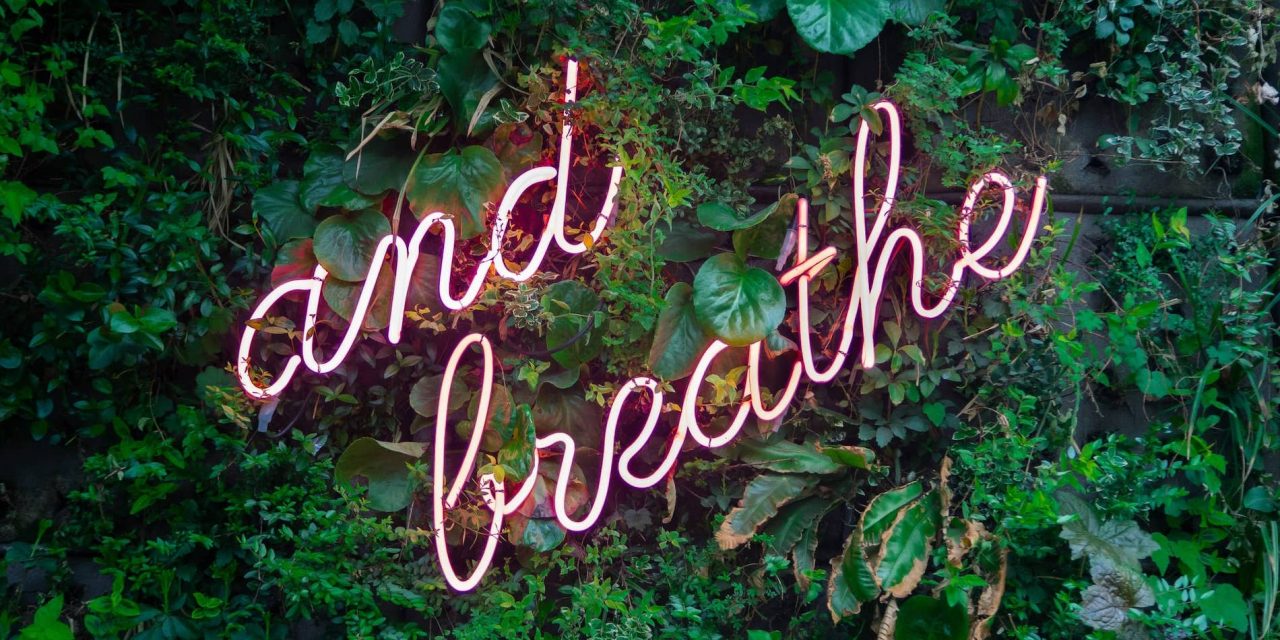Are you a highly sensitive person suffering from anxiety? In this article, you will discover 10 powerful tips to reduce anxiety in your daily life.
Estimated reading time: 12 minutes
Anxiety seems to be a part of my life as a highly sensitive person. While my life is very HSP friendly and calm in terms of sensory stimulation, anxiety still is a major challenge for me.
For as long as I can remember, I felt anxious. When I was a little child, I worried about homework, social connections, upcoming events, the way I behaved and looked and so much more.
Logically, this thought pattern followed me throughout the years into adulthood. After all, anxiety is not something that does just disappear over night.
At the beginning of my twenties, I decided to tackle my anxiety. I was so done with anxious thoughts. 99% of my anxious thoughts never happen. Imagine what I could do with all the energy I waste on worrying and overthinking? And if you relate to this: imagine what YOU could do with all the extra energy.
Therefore, I decided to investigate this topic further. For the past 5 years, I put practical methods to reduce anxiety to the test. In this article, I will share my favorite anti-anxiety practices. Hopefully, they will help you as well.
Let’s wave anxiety goodbye in order to finally thrive as a highly sensitive person.
Here’s What You’ll Learn:
What Is Anxiety?
In order to be able to reduce anxiety as a highly sensitive person, you may want to know what anxiety actually is.
According to Medlineplus, anxiety is a feeling of fear, dread and uneasiness. Anxiety may pop up in many situations in your life. For example, you may feel anxious before an important test or prior to a job interview. It is a common human reaction that in best case can help you to feel more energetic. Also, it helps you to stay alert and aware.
However, when you struggle with too many anxious thoughts about minor situations in life, it may often make you feel sweaty, restless and increase your heartbeat. In that case, anxiety can make you feel overwhelmed. A feeling that you as a highly sensitive person know all too well.
The Science Behind Anxiety
Now that we know what anxiety is, it is time to investigate the science behind it. In the past, scientists concluded that the part of the brain called amygdala is what causes anxiety. However, recent studies have shown that anxiety is the result of different regions of the brain working together to produce anxiety.
You could see them cooperating as a fear network, communicating with each other to produce anxious thoughts and feelings. The interactions between the different areas of our brain are what cause us to feel anxious.
The regions of the brain believed to be involved in the creation of anxiety, are the amygdala (part of the emotional brain), the frontal lobe (the cognitive brain) and the dorsal anterior cingulate cortex (amplifier of the fear signals from the amygdala). However, scientists are still working hard on researching anxiety to find the true core of its existence.
If you want to learn more about the science behind anxiety, you may want to read ‘Unwinding Anxiety: New Science Shows How to Break the Cycles of Worry and Fear to Heal Your Mind’.
What Are Common Symptoms Of Anxiety?
Some of the common symptoms of anxiety are the following:
- Feeling light-headed;
- Experiencing a feeling of restlessness;
- Fast breathing;
- Sweating;
- Problems with sleeping;
- Experiencing panic attacks;
- Irregular heartbeat;
- Grinding your teeth;
- Clenched jaw;
- Tense muscles;
- Changes in sex drive.
The Highly Sensitive Person And Anxiety
The highly sensitive person is more likely to experience anxiety compared to non-HSP’s. You may wonder why that is the case.
Science shows that highly sensitive people have heightened activity in their amygdala. Hence, we are more alert about what is going on in our surroundings.
In addition, we are more prone to overthinking. As mentioned above, anxiety is activated by different areas in our brain working together to produce anxious thoughts and feelings.
When the amygdala and the other regions in the brain start to communicate and this goes paired with overthinking, anxiety most likely will be the result. Consequently, the highly sensitive person may be more prone to experience anxiety. Therefore, it is crucial to learn how to prevent anxiety in order to reduce it effectively.
If you’d like to discover more about the highly sensitive person and anxiety, you may want to read ‘The Highly Sensitive: How to Stop Emotional Overload, Relieve Anxiety, and Eliminate Negative Energy’.
10 Tips To Reduce Anxiety As A Highly Sensitive Person
Here are 10 methods that may help you as a highly sensitive person to reduce anxiety in daily life:
#1 Adjust Your Food Diet
One of the major life changers for me as a highly sensitive person to reduce anxiety, was to change my food diet.
For instance, I chose to reduce my sugar intake. Sugar itself does not cause anxiety. However, it causes several bodily reactions which may make you feel anxious, once you become aware of them. Therefore, reducing your sugar intake may be worth a try.
Additionally, I reduced my intake of gluten. I do still eat gluten, but I eat much less of it. Some studies identified that there is a link between gluten and the level of anxiety. People who went gluten-free experienced a decrease in anxiety.
However, if you are not gluten intolerant (like me), simply reducing your intake of gluten may already help in reducing your anxiety. For me, it was a major game changer.
If you’d like to learn more about food and anxiety, you may want to read ‘Anxiety-Free with Food: Natural, Science-Backed Strategies to Relieve Stress and Support Your Mental Health’.
#2 Reduce Intake Of Caffeine
Another tip when it comes to reducing anxiety as a highly sensitive person, is to consume less caffeine. It is a well-known fact that highly sensitive people are more sensitive towards the effects of caffeine.
Taking into account that caffeine may increase your feelings of anxiety, shows how important it is to be aware of your caffeine consumption. If you are rather anxious in your day to day life, you may want to skip that second cup of coffee.
For instance, I only drink coffee on days where I feel less anxious and tired. When I already feel anxious without coffee, I choose to drink another beverage instead. Knowing the effects of caffeine on my body helped me greatly in managing my anxiety as a highly sensitive person.

#3 Apply Breathing Techniques
Breathing correctly and becoming more conscious of my breathing was a real life-changer for my anxiety.
Your entire system responds to the way you breathe. When you feel anxious, your breathing becomes faster, which again increases your heartbeat. In worst case, this results in a panic attack.
Therefore, the best thing you can do when you feel anxious is to first focus on your breathing. For instance, the 4-4-4 method may be worth a try:
- Breathe in for 4 seconds
- Hold your breath for 4 seconds
- Exhale 4 seconds
- Repeat as often as you like
I like this method because you can do it wherever you want. Whether you are at home, at a social event or commuting; it is always available to you.
Once your breath slows down, you may want to continue reducing your anxiety with the next methods on this list.
#4 Create Positive Affirmation Statements
This method is one of the most powerful ways to not only tackle your anxiety, but to also elevate your mindset. When you feel anxious, your mind often goes into auto-pilot.
For instance, you start thinking one anxious thought like ‘I don’t have enough money’, which then gets continued by thoughts like ‘I will not be able to pay my bills’ or ‘If I don’t pay my bills, I will be homeless’. As you can see, it is an automated process. Therefore, it is important to break that pattern before it overwhelms you.
For that, I use positive affirmation statements. A positive affirmation is a short sentence that makes you feel good and calm. For instance, one of my anti-anxiety affirmations is:
Everything is okay in the here and now. I am safe.
As many of my anxieties start with worries about the past or the future, this is an incredibly powerful statement for me. It immediately transports me back to the now.
However, affirmation statements are personal. Therefore, take your time to find out what you worry about and create opposite, powerful affirmation statements that calm you down when these anxious thoughts occur.
If you’d like some variation in your affirmation statements, you may want to check out this adorable, creative and fun affirmation card deck: ‘Affirmators! 50 Affirmation Cards to Help You Help Yourself – Without The Self-Helpy-Ness!’
#5 Use Guided Imagery (GI)
Another powerful method to reduce anxiety as a highly sensitive person, is to use guided imagery. This entails that you visualize a calm, peaceful place whenever you feel anxious.
Studies have shown that GI significantly reduces anxiety and stress and helps you to relax. For instance, hospitals often use guided imagery prior to intense treatments, in order to relax their patients.
For me, visualizing my happy place helps me to break anxious thought patterns and return to a place of inner peace. Therefore, consider to give it a try. To get started, you may want to try this meditation:
#6 Use Essential Oils
Studies have shown that certain essential oils reduce symptoms of anxiety. Therefore, I gave it a try and I must say that I notice a great difference in my anxiety levels.
I purchased an aromatherapy diffuser and lavender oil to tackle my anxiety. Whenever I turn it on, I feel more calm and relaxed. Especially before going to bed at night, I love to turn on my oil diffuser for an hour or two.
Here is a list of the essential oils that may help you with reducing anxiety as a highly sensitive person:
Please keep in mind that all of these essential oils should be used in moderation. Also consider that not all of these essential oils are healthy for your pets. Make sure to choose the right way of usage, according to your own situation.
#7 Reduce Sensory Stimuli
If you as a highly sensitive person struggle with anxiety, this method is one of the first ones to check off your list. Once you reduce sensory stimuli around you, your nervous system will relax. Therefore, this may impact your level of stress and anxiety in a very positive way.
For me, moving to a calmer area, reducing noise with the amazing Calmer ear buds and creating a sensory pleasing home affected my anxiety levels positively. I feel more calm in daily life and am able to relax much deeper.
Therefore, try to analyze your current situation: How much sensory stimulation do you currently experience? In what ways could you reduce your sensory stimuli in daily life?
#8 Challenge Your Thoughts
As I mentioned, anxiety often gets triggered by specific thoughts. Therefore, one of the most powerful ways to tackle anxiety as a highly sensitive person, is to challenge your thoughts.
Whenever an anxious thought occurs, ask yourself the following questions:
- Is this thought true or does it just seem that way?
- Is it likely that this will happen?
- If you answered ‘yes’ to the questions above: What would be the worst possible outcome, if this happens?
- How would I tackle the worst possible outcome? How could I prepare for it right now?
Instead of replaying the anxious thought, try to challenge it and think of practical solutions. This way, you will calm your mind and body rather quickly.
However, I only recommend you to do this for anxious thoughts that are very likely to happen. If it is a thought that has no evidence of being real, try to apply method #9 or #10 instead.
#9 Practice Mindfulness
Mindfulness is the art of bringing your mind back to the here and now. Studies have shown that practicing mindfulness effectively reduces stress levels, anxiety and depression.
Therefore, you may want to give it a try. In the beginning, mindfulness may be hard for somebody suffering from anxiety. Your mind may wander off to other (anxious) thoughts rather quickly.
However, don’t be too hard on yourself. Mindfulness is a practice that takes time and is gentle. Whenever you notice your mind drifting off, simply bring your attention back to your breathing and try again. Be gentle on yourself.
If you’d like to get started with mindfulness, you may want to try this mindfulness meditation.
Also, I truly enjoy creative mindfulness activity books like ‘A Book That Takes Its Time: An Unhurried Adventure in Creative Mindfulness (Flow)’. This easily bring your attention back to the here and now.
#10 Get Out Of Your Head By Doing
Whenever you notice your mind drifting off into anxiety land, you may want to get out of your head by doing something physical. For instance, I start cleaning my home or fold my laundry, whenever I notice that I am stuck in my mind.
Therefore, try to make a to do list of physical tasks that you could do whenever you become aware of your anxious thoughts. Put that list somewhere you can easily see it, so you can check off items when you are done.
Good Luck With Reducing Anxiety As A Highly Sensitive Person
Now that you have discovered these ten methods, it is time to create change. You are able to reduce your anxiety. However, remember that this is a process that won’t happen overnight. Reducing anxiety as a highly sensitive person takes time and patience.
Also, it is important to maintain a good self care practice on a daily basis. It is better to prevent the fire, rather than having to extinguish it afterwards. Therefore, maintain good mental health by implementing some of these practices in your daily routine.
Good luck with reducing anxiety! You can do it!






